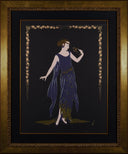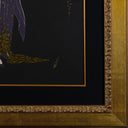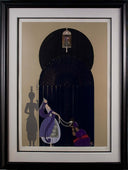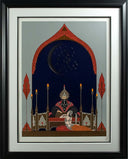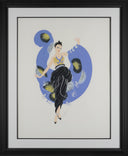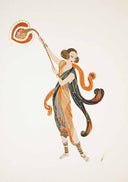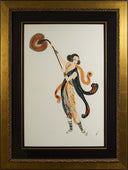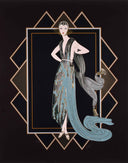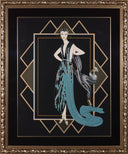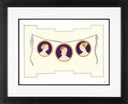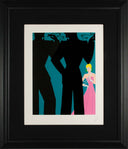Flower Petal Gown, 1990
Details
Year: 1990
Edition: 650
Sheet size: 38.25 x 29.5"
Image size: 31.5 x 23.5"
Framed size: 48 x 40"
Signature: estate signature stamp lower right
About the Work
"Flower Petal Gown" is an expertly crafted serigraph on paper with foil stamping and an image size of 31.5 x 23.5". From the edition of 650, the art is estate-stamped 'Erté' lower right. Framed in a contemporary, black and gold-tone frame. The artwork ships framed and is accompanied by a certificate of authenticity.
Based on the fashion designs for Harper’s Bazaar in April of 1920, "Flower Petal Gown" shows the tender side of Art Deco Design. Erté created this graphic with flowing lines and soft curves, embellished with a border of petals and blooms that echoes the flowers in her hand and on her gown. This beautiful design later inspired a bronze sculpture entitled "Flower Petal Gown".
This work is published by Chalk & Vermilion Fine Arts, an affiliate of Martin Lawrence Galleries, no prior ownership.
About the Artist
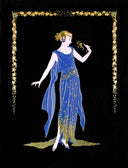
Flower Petal Gown, 1990
MORE FROM THIS ARTIST
Start your collection with guidance you can trust
For nearly 50 years, we’ve helped new collectors find artwork they love and understand the stories behind each piece. Our gallery consultants offer personalized guidance, whether you’re exploring originals, limited editions, or discovering an artist for the first time. Visit your nearest gallery to start collecting with confidence.


Frequently Asked Questions
Your artwork comes with a Certificate of Authenticity (or Letter of Authenticity), professional packaging, and insured delivery.
We ship fully insured, using trusted carriers. Each piece is professionally packed to ensure safe arrival. Shipping times vary based on the location of the art, its destination, and whether or not it is framed (ready to ship) at the time of your purchase.
All our works come beautifully framed. Some print multiples may have framing options if we have unframed editions available in our warehouse. Our in-house framing provides high-quality moulding, acid-free materials and either UV plexiglass or framer’s grade acrylic. High value works may be framed in custom, closed-corner frames, and are often framed in Optium museum glass for enhanced clarity.
No, Martin Lawrence Galleries does not provide appraisal services. To ensure that appraisals are fully independent and unbiased, it is best practice for them to be carried out by certified appraisers who have not had prior involvement with the sale or handling of the artwork. For that reason, we do not appraise artworks that we handle, and instead recommend that collectors seek an independent, certified appraiser.
No, we own the vast majority of our inventory and do not seek out consignments from Sellers.
Yes, if you purchase from a local gallery, your consultant will be happy to assist you with hanging the artwork in your home.
Martin Lawrence Galleries has seven galleries across the country where you may be able to see the exact piece you are interested in. Print and sculpture multiples are more likely to be in several places for possible viewings whereas unique artworks will be constrained to one location. We are happy to facilitate your visit to one of our galleries if that is convenient for you. We can also take videos and extensive photos if a visit is not possible. Please contact us at martinlawrencegalleries.com.
We have over 50 years of experience, seven gallery locations across the United States, and a track record of connecting collectors with the right artwork.
No. Our consultants are here to guide you through the process, answer your questions, and make buying art simple and rewarding.
We encourage you to buy what you love. Our consultants will help you find the right piece that fits your taste and collection.
Please visit our page on specific instructions on how to take care of your artworks. Care Instructions
We stand by our artwork. Please review our detailed return policy here.


